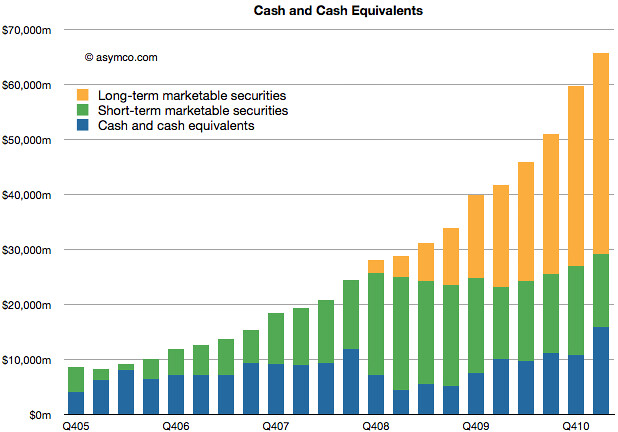With Billions of dollars in the bank, Morgan Stanley analyst Katy Huberty recently issued a research note claiming that Apple will either issue a dividend or initiate a stock buy back. Huberty confidently writes, “We believe Apple is more likely than ever to return cash to shareholders.”
This of course flies in the face of what Steve Jobs told Apple shareholders in 2010. During a February 2010 shareholder meeting, Jobs dismissed the idea of a dividend and explained that Apple likes to keep its cash handy so that Apple can easily take advantage of attractive business/strategic opportunities when they present themselves.
We know if we need to acquire something – a piece of the puzzle to make something big and bold – we can write a check for it and not borrow a lot of money and put our whole company at risk. The cash in the bank gives us tremendous security and flexibility.
As of Apple’s most recent SEC filing, the company has $12.1 billion in cash, $16.3 billion in short term securities, and $47.8 billion in long term securities. All told, Apple has $72.2 billion dollars at its disposal.

So does Apple really need all that cash?
Well, it sure came in handy when Apple was part of a consortium that purchased Nortel’s patent portfolio for $4.5 billion. And just recently we came across a rumor claiming that Apple made a $800 million bid for Dropbox.
Clearly, Apple isn’t just sitting around on its arse talking up a big acquisition game and not following through. Apple doesn’t make acquisitions terribly often, but when it does, they are strategic purchases and those deals, while perhaps relatively insignificant by themselves, add up quickly and require a decent amount of cash on hand.
Further, we’re not privy to Apple’s product roadmap so who’s to say that that cash won’t be utilized for future endeavors like content deals and and volume component purchases that can sometimes cost billions.
Here’s the thing – dividends are arguably used when a company is at a loss for what to do with all of their accumulated cash. That said, one could argue that a company resigned to giving profits back to shareholders is at a point where it’s no longer innovating and growing.
Consequently, if Apple believes its shareholders are better served by reinvesting its profits back into the company and keeping cash on hand for future acquisition targets, who are we to argue with that logic given the astronomical rise in Apple’s stock price over the past few years? It stands to reason that Apple’s unbelievably high share price, which for a brief period this Summer made it the most valuable company on the planet, is payback enough for investors.
Besides, let’s not ignore that as successful as Apple’s been over the past few years, it still has tremendous room for growth both in its Mac business and with respect to the iPhone. And remember that Apple is just opening up shop in China, an unparalleled growth opportunity for any company if there ever was one.
So despite Apple’s impressive market cap, it’s very far from reaching its ceiling. That said, a dividend at this point is, more likely than not, premature.
But in the interest of speculation, let’s assume Apple will issue a dividend sometime soon. How much would investors get back?
William Haynes writes for Seeking Alpha:
Prior history shows Apple had a payout ratio of 14% in 1995. However, at that time the company was trying to invest in plenty of new initiatives with slow sales and profit growth. Perhaps a better example would be Microsoft, who currently pays out about 25% of earnings as dividends. If that were the case for Apple (whose most recent earnings were $7.79 per share), then one could predict a quarterly dividend of $2 a share, or a 2.1% yield.
That’s $8/share per year, which we can’t lie, is not too shabby.
And what about a stock split?
Well, those might work to make Apple shares seem more affordable but they do little to change the company’s fundamentals. It’s pure psychology really. A stock trading at $120 seems a lot more affordable than the same stock trading at $360 even though it’s all about the percentage of stock increase more than anything else.
What’s more, a stock split might have the unintended affect of making the stock more prone to fluctuations in the overall market and infuse an undesirable volatility into the equation.
As for a buyback, they can often be losing propositions for companies who buy shares and then see the company share price falter. Apple should invest in itself not through a stock buyback, but via investing in products, people, and ideas.
Summing things up, with Apple shares continuously on the rise, why fix something that’s not broken with a divided, stock buy back, or stock split?





Mon, Sep 19, 2011
Finance, News